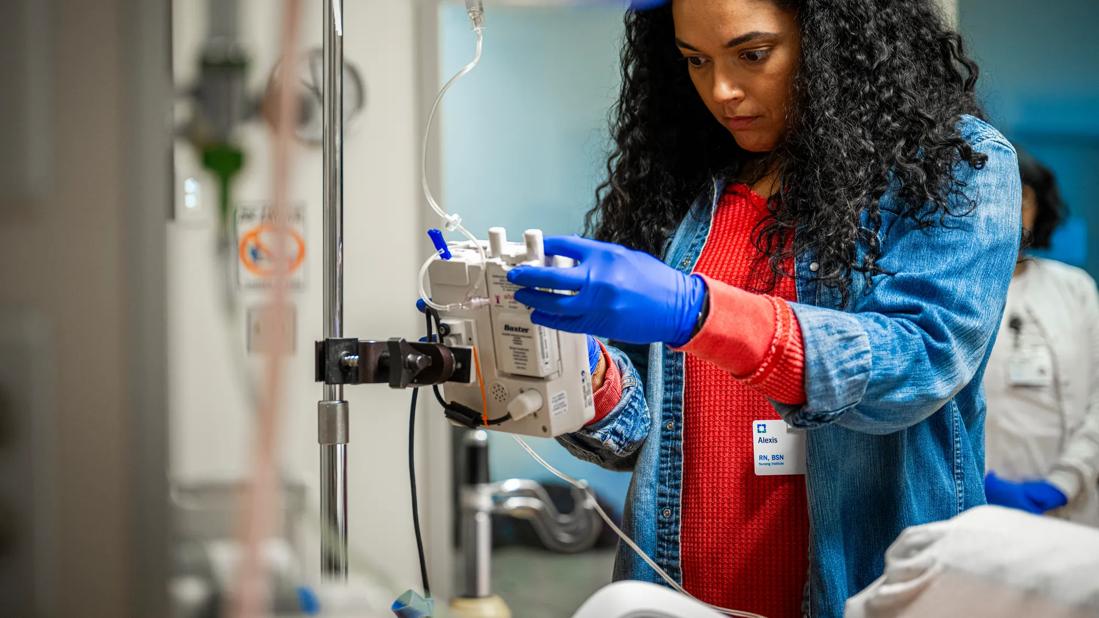Leader collaboration is key to overcoming challenges

By Meredith Foxx, MSN, MBA, APRN, NEA-BC, Executive Chief Nursing Officer
Lisa Baszynski, MSN, RN, NE-BC, Senior Director, Ambulatory Nursing Education
Cindy Willis, DNP, MBA, RN, CMSRN, Senior Director, Nursing Education
Today’s new nurses need more than skills. They must have the ability to assess knowledge and be competent in evidence-based practice and research, health policy and system improvement. They should embrace collaboration and multi-disciplinary teamwork and excel in critical thinking and decision-making.
Advertisement
Cleveland Clinic is a non-profit academic medical center. Advertising on our site helps support our mission. We do not endorse non-Cleveland Clinic products or services. Policy
It’s a tall order for nursing education leaders, who face a decline in new-nurse competency, a rapidly changing healthcare environment and increased need for specialty education, and greater. The following provides further insight into these challenges.
Across healthcare, the overall competency of new graduate registered nurses is declining, underscoring a clear gap in practice readiness. As reported in the Online Journal of Issues in Nursing, a decade of Performance Based Development System assessments representing more than 10,000 new graduate RNs reveals a year-over-year decline in initial competency (research led by Joan Kavanagh, PhD, RN, NEA-BC, ANEF, FAAN and Christine Szweda, MS, BSN, RN). The COVID-19 pandemic has complicated the new nurse’s transition to practice with truncated clinical experiences and modified teaching methods.
New graduates need education that is competency-based and focused on clinical judgment, critical thinking and interdisciplinary collaboration. To support new graduate RNs, nursing education leaders must collaborate to strengthen academic and practice partnerships. They should support and enhance nurse residency programs and devise personalized adaptive learning strategies that are based on competency, not timeframes.
Increasing online programming and technology is also important. This includes the use of artificial intelligence (AI) and virtual reality simulation as well as adaptive learning platforms that are known to decrease cognitive load and promote learning through brain-based neuroscience methods, such as microburst education and spaced learning.
Advertisement
At the peak of the COVID-19 pandemic, the healthcare environment was changing by the minute, and the pace of change isn’t letting up. Medical knowledge and technologies expand daily. Awareness of change is vital to those in nursing education, and leaders should be part of an organization’s planning or implementation of innovative care delivery models. These changes include a continuum of care that ranges from episodic to lifelong care, system-based practice changes. Technological advancements such as AI, telehealth, remote monitoring, telephone triage and home-based care will become ever more important.
Areas requiring special training range from disease prevention and health promotion in primary care settings to geriatric care, chronic care management, care in the home and holistic care. It also includes areas such as value-based care, healthcare change and population health.
Advanced degrees and specialty certifications are becoming the norm and will require seamless academic progression. Those in nursing education should promote life-long career learning, including nursing leadership and executive nursing positions.
Although the challenges in nursing education today are significant, they are certain to be overcome. As nursing education leaders continue to work together to enact change and adopt frameworks that focus on continuous life-long learning, academic progression and continuing competencies, the future points to a positive path ahead.
Advertisement
Advertisement

Advanced software streamlines charting, supports deeper patient connections

How holding simulations in clinical settings can improve workflow and identify latent operational threats

Interactive Zen Quest experience helps promote relaxing behaviors

Cleveland Clinic and IBM leaders share insights, concerns, optimism about impacts

Cleveland Clinic partners with Palantir to create logistical command center

A Q&A with organizational development researcher Gina Thoebes

Cleveland Clinic transformation leader led development of benchmarking tool with NAHQ

Raed Dweik, MD, on change management and the importance of communication